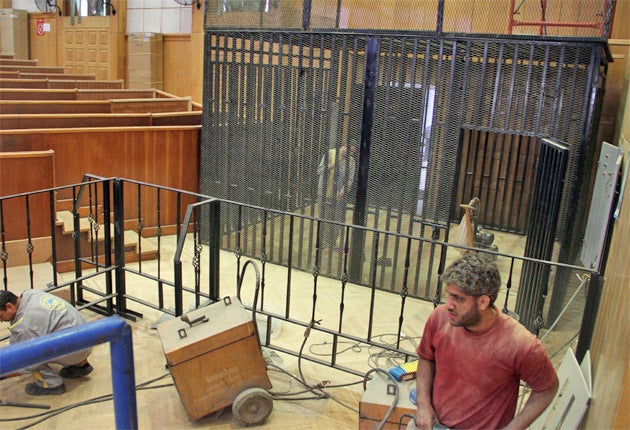Robert Fisk: Egypt awaits first trial of an Arab Spring dictator
Former president Hosni Mubarak is charged with corruption and the killing of protesters


Your support helps us to tell the story
From reproductive rights to climate change to Big Tech, The Independent is on the ground when the story is developing. Whether it's investigating the financials of Elon Musk's pro-Trump PAC or producing our latest documentary, 'The A Word', which shines a light on the American women fighting for reproductive rights, we know how important it is to parse out the facts from the messaging.
At such a critical moment in US history, we need reporters on the ground. Your donation allows us to keep sending journalists to speak to both sides of the story.
The Independent is trusted by Americans across the entire political spectrum. And unlike many other quality news outlets, we choose not to lock Americans out of our reporting and analysis with paywalls. We believe quality journalism should be available to everyone, paid for by those who can afford it.
Your support makes all the difference.We shall not speak his name. Along the road to his trial – if it actually takes place – are rows of watermelon stands, vast green hard-skinned "batiqs" piled on top of each other on broken wooden carts, the favourite ice-cold fruit for the "iftar" meal that closes every day of fasting this Ramadan. At the end of each cart, a single "batiq" has been sliced open by its sweating vendor to show its rich, red, juicy interior. But of course, what every Egyptian wants to know is whether the "Malek al-Batiq" – the King of Watermelons – will actually appear in his golden cage at the end of the road today.
Arab leaders are usually doomed when their names are attached to popular fruit. Yassir Arafat became the original "Malek al-Batiq" in 1982 after an Israeli officer warned that Palestinian "terrorists" were putting explosives inside watermelons. But today is the only day when the man who may be in the cage – with or without his sons Gamal and Alaa, and an ex-interior minister, and another duke or two – doesn't need a name.
The cage is, of course, not golden, but black iron. It's so new, they say, that you can smell the fresh paint. The 600 souls to be allowed into court, lawyers, of course, and quite a clutch of victims of the revolution when the King of Watermelons tried to hang on to power, and the usual titans of world journalism, will be expressing some righteous wrath if the old man is not on display within it. Many were the defendants – mostly Islamists – who have shouted their defiance from within these cages, a special invention of the man who is supposed to stand trial for corruption and the street killing of revolutionaries today.
I used to watch these earlier trials, the bearded men in the cage swearing to sacrifice the lives of their wives and children for "sharia" law. They were sad, brave, pitiful; and most to whom I talked were hanged on the signature of the King of Watermelons.
At the police college, a four-square-mile complex of sand and broiling buildings in the desert, where the trial will supposedly be held, a giant silver sign – suitably lopsided, like the authentic "HOLLYWOOD" above LA – says "POLICE ACADEMY". Only when you look at the entrance can you make out, very faintly, the original word "M-U-B-A-R-A-K", gently eased from the wall above.
Outside, a clutch of technicians is apparently preparing a giant screen for those who can't get inside today. There's also a mile or two of coiled razor wire, so new that it glistens like ice on the hot walls. I've to be at Gate 8 at six this morning – 5am London time, O reader – but somehow I have my doubts. No helicopters. No military checkpoints, an anti-aircraft missile battery sleeping away in the sand dunes, as it has for weeks. In fact, the only soldiers I saw were harassing the last hundred demonstrators in Tahrir Square. One was standing atop the Egyptian parliament, idly twirling a wood club in his right hand. Not a good sign.
Yes, the phones between the Land of the Prophet and the Land of the Pharaohs were obviously hotter than midday yesterday, the former – now in the land of the Saudis – gold-plated, no doubt, the latter rather more grimly held in the headquarters of the Supreme Military Council in Cairo, by the guys who really, really would prefer to find an excuse to postpone the whole affair until the King of Watermelons has passed away. That would bring in a few bob from the men in Riyadh. And the iron cage could be used for the little watermelons, the sons and former satraps.
But what would the angry, grieving families say if they had nothing to consume at "iftar"? An appearance by the old man might at least give the impression there'd been a revolution... Or are there more important things these days?
Join our commenting forum
Join thought-provoking conversations, follow other Independent readers and see their replies
Comments